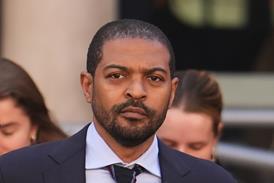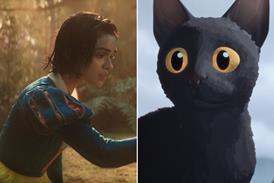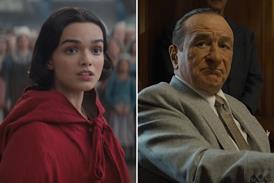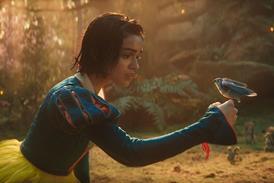Animated LOTR spin-off places a fearless female protagonist in a lacklustre action-adventure
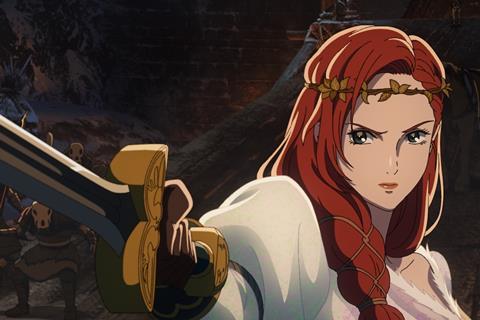
Dir: Kenji Kamiyama. US. 2024. 134mins
The Lord Of The Rings franchise gets a much-needed jolt of feminist energy with The War Of The Rohirrim, a prequel set nearly 200 years before the Oscar-winning live-action trilogy of the early 2000s. Whereas those previous films were dominated by their male leads, this animation tells the story of a brave princess who must rise up to save her imperilled kingdom.
Lacks the glimmering slickness of Hollywood animation
The new picture mostly avoids the legendary characters from J.R.R. Tolkien’s epic fable, fleshing out a series of battles barely described in the books. The result is an old-fashioned action-adventure replete with battle scenes and hearty proclamations such as “We will paint the dawn red with the blood of our foes!” But the hand-drawn animation style has its limitations, and the film’s central figures are not as magnetic as before.
Warner Bros. unveils The War Of The Rohirrim on December 13 in the UK and US, the first Tolkien film since 2014’s The Hobbit: The Battle Of The Five Armies. Together, the three Hobbit films and the Lord Of The Rings trilogy brought in almost $6 billion, so surely there are numerous fans still interested in this world. (Prime Video is currently streaming a prequel series, The Rings Of Power.) But despite the fact that Peter Jackson serves as executive producer, The War Of The Rohirrim may seem too adjacent a property to muster similar enthusiasm. Consequently, casual viewers may decide to skip this mediocre stopgap and wait for the live-action The Hunt For Gollum, arriving in 2026 and directed by Gollum himself, Andy Serkis.
Here, Gaia Wise voices Hera, whose father is Helm Hammerhand (Brian Cox), the mighty king of Rohan. Hammerhand wishes to marry off his daughter, but she rejects the proposal of the seasoned warrior Wulf (Luke Pasqualino), a lifelong friend who has always loved her, insisting that she wants the independence to marry who she chooses — or not at all. Her refusal angers Wulf, leading to a violent altercation that prompts Hammerhand to banish Wulf, who vows vengeance against the king.
Director Kenji Kamiyama, who previously directed anime projects like the 2017 film Napping Princess, expands on a battle that was referenced in the appendices of Tolkien’s book The Lord Of The Rings, turning it into a two-hour-plus saga about a proud, ageing king and his free-spirited, underestimated daughter. Wise imbues Hera with a sense of regal bearing, handily tackling the Tolkien-esque dialogue, which is earnest sometimes to a fault. (That said, franchise fans will be relieved that the filmmakers have resisted any temptation to pepper the lines with jokey quips or contemporary attitude.)
From the first moment we see Hera riding her horse at top speed across an open field, there is no question she is destined for greatness, and The War Of The Rohirrim methodically dramatises how she makes the leap to fearsome fighter — even though her protective father believes she should leave war to her strapping brothers.
The film’s look, which incorporates hand-drawn images and motion-capture, lacks the glimmering slickness of Hollywood animation. Indeed, the characters’ faces are not especially expressive and their motions are jerkier than the norm. Presumably, Kamiyama wants to create an anime that feels timeless — maybe even a bit antiquated — in order to suggest an ancient tale that has been lost to history.
When the director stages large-scale battle scenes — of which there are many — this approach succeeds. (Nighttime war sequences lit only by the fires of a burning fortress are particularly striking, as are shots of terrifying fantastical beasts both on land and in water.) But in dialogue scenes, the bland character design detracts from the drama. Ironically, that stiffness is less troublesome during action set pieces since it lends weary warriors like Hammerhand an almost stoic grandeur.
Cox roars and bellows impressively as a quick-tempered king who foolishly believes no force can topple his kingdom, learning too late the treachery and cleverness of his vindictive foe. The film tries to establish Hera and Wulf as tormented combatants — former friends torn asunder because she does not reciprocate his love — but Pasqualino is hamstrung playing a one-note baddie.
More rewardingly, The War Of The Rohirrim offers a familiar but resonant message about female empowerment, arguing that Hera should not be dismissed as a leader just because she is a woman. Regrettably, such laudable sentiments are quickly undercut by a predictable late-reel tie-in to the larger Lord Of The Rings series, as the film hints at the possibility of future instalments featuring iconic franchise figures. Gender equality is all well and good, but apparently preserving and expanding the Tolkien brand is a more paramount concern.
Production companies: Warner Bros. Animation, Sola Entertainment
Worldwide distribution: Warner Bros.
Producers: Philippa Boyens, Jason DeMarco, Joseph Chou
Screenplay: Jeffrey Addiss & Will Matthews and Phoebe Gittins & Arty Papageorgiou, story by Jeffrey Addiss & Will Matthews and Philippa Boyens, based on characters created by J.R.R. Tolkien
Editing: Tsuyoshi Sadamatsu
Music: Stephen Gallagher
Main voice cast: Brian Cox, Gaia Wise, Luke Pasqualino, Laurence Ubong Williams, Lorraine Ashbourne, Miranda Otto





